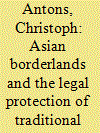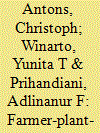|
|
|
Sort Order |
|
|
|
Items / Page
|
|
|
|
|
|
|
| Srl | Item |
| 1 |
ID:
121987


|
|
|
|
|
| Publication |
2013.
|
| Summary/Abstract |
Traditional knowledge related to biodiversity, agriculture, medicine and artistic expressions has recently attracted much interest amongst policy makers, legal academics and social scientists. Several United Nations organizations, such as the World Intellectual Property Organization (WIPO) and the Convention on Biological Diversity under the United Nations Environmental Programme (UNEP), have been working on international models for the protection of such knowledge held by local and indigenous communities. Relevant national, regional or provincial level legislation comes in the form of intellectual property laws and laws related to health, heritage or environmental protection. In practice, however, it has proven difficult to agree on definitions of the subject matter, to delineate local communities and territories holding the knowledge, and to clearly identify the subjects and beneficiaries of the protection. In fact, claims to 'cultural property' and heritage have led to conflicts and tensions between communities, regions and nations. This paper will use Southeast Asian examples and case studies to show the importance of concepts such as Zomia, 'regions of refuge' and mandala as well as 'borderlands' studies to avoid essentialized notions of communities and cultures in order to develop a nuanced understanding of the difficulties for national and international lawmaking in this field. It will also develop a few suggestions on how conflicts and tensions could be avoided or ameliorated.
|
|
|
|
|
|
|
|
|
|
|
|
|
|
|
|
| 2 |
ID:
175480


|
|
|
|
|
| Summary/Abstract |
In the last two decades, some Javanese rice farmers have learned to be plant breeders with the help of Farmer Field Schools for Participatory Plant Breeding. However, they have experienced problems with seed and intellectual property laws primarily focused on the strengthening of the seed industry and compliance with development plans. A number of farmers have been prosecuted for experimenting with seeds, prompting a partly successful challenge to relevant provisions in Indonesia’s Constitutional Court. Subsequent legislative changes have restored some farmers’ rights, but also brought new reporting requirements and limitations. Using James Scott’s concept of “transformative state simplifications,” this article shows that legal challenges to regulations are just one strategy of self-help. The political reform process and possibility for constitutional challenges have opened up space for debates about how farmers can benefit from laws that seek to regulate their cultivars. The United Nations Declaration on the Rights of Peasants and other developments are likely to intensify discussions about what precisely various laws mean by their encouragement of “small farmer varieties,” “food sovereignty,” and a “sustainable agricultural cultivation system.”
|
|
|
|
|
|
|
|
|
|
|
|
|
|
|
|
|
|
|
|
|